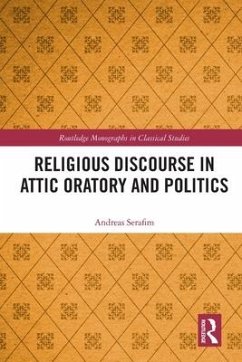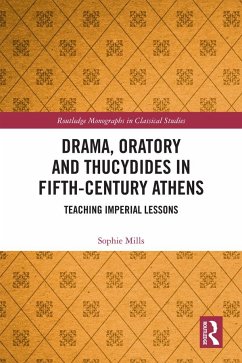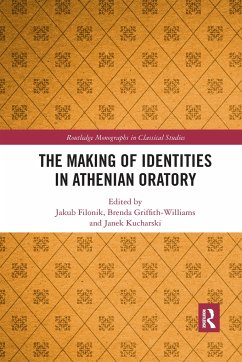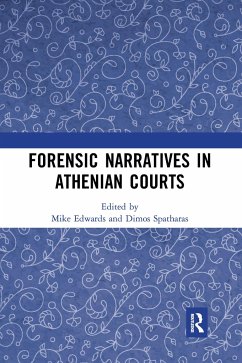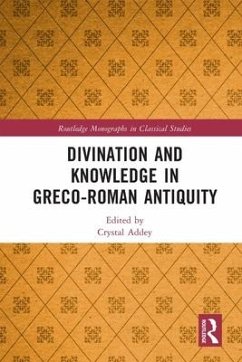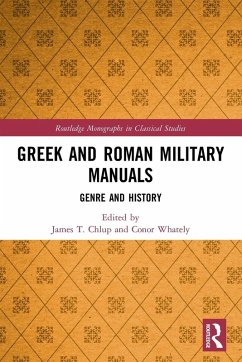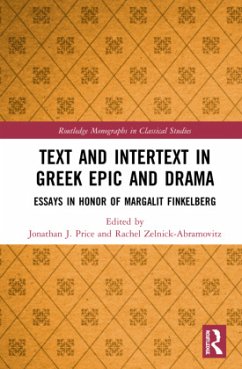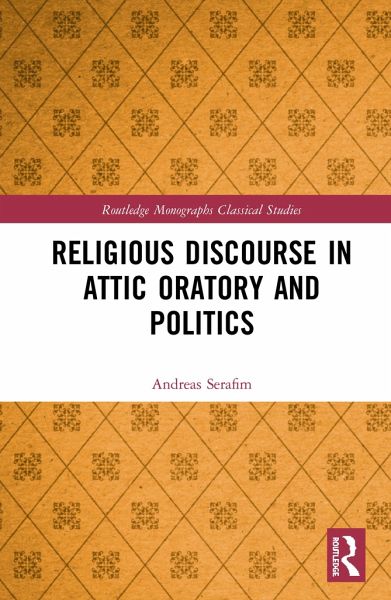
Religious Discourse in Attic Oratory and Politics
Versandkostenfrei!
Versandfertig in 6-10 Tagen
154,99 €
inkl. MwSt.
Weitere Ausgaben:

PAYBACK Punkte
77 °P sammeln!
The book offers a critical investigation of a wide range of features of religious discourse in the transmitted forensic, symbouleutic and epideictic orations of the Ten Attic Orators, a body of 151 speeches which represents the mature flourishing of the ancient art of public speaking and persuasion.Serafim focuses on how the intersections between such religious discourse and the political, legal and civic institutions of classical Athens help to shed new light on polis identity-building and the construction of an imagined community in three institutional contexts - the law court, the Assembly ...
The book offers a critical investigation of a wide range of features of religious discourse in the transmitted forensic, symbouleutic and epideictic orations of the Ten Attic Orators, a body of 151 speeches which represents the mature flourishing of the ancient art of public speaking and persuasion.
Serafim focuses on how the intersections between such religious discourse and the political, legal and civic institutions of classical Athens help to shed new light on polis identity-building and the construction of an imagined community in three institutional contexts - the law court, the Assembly and the Boul : a community that unites its members and defines the ways in which they make decisions. After a full-scale survey of the persistently and recurrently used features of religious discourse in Attic oratory, he contextualizes and explains the use of specific patterns of religious discourse in specific oratorical contexts, examining the means or restrictions that thesecontexts generate for the speaker. In doing so, he explores the cognitive/emotional and physical/sensory reactions of the speaker and the audience when religious stimuli are provided in orations, and how this contributes to the construction of civic and political identity in classical Athens.
Religious Discourse in Attic Oratory and Politics will be of interest to anyone working on classical Athens, particularly its legal institutions, on ancient rhetoric, and ancient Greek religion and politics.
Serafim focuses on how the intersections between such religious discourse and the political, legal and civic institutions of classical Athens help to shed new light on polis identity-building and the construction of an imagined community in three institutional contexts - the law court, the Assembly and the Boul : a community that unites its members and defines the ways in which they make decisions. After a full-scale survey of the persistently and recurrently used features of religious discourse in Attic oratory, he contextualizes and explains the use of specific patterns of religious discourse in specific oratorical contexts, examining the means or restrictions that thesecontexts generate for the speaker. In doing so, he explores the cognitive/emotional and physical/sensory reactions of the speaker and the audience when religious stimuli are provided in orations, and how this contributes to the construction of civic and political identity in classical Athens.
Religious Discourse in Attic Oratory and Politics will be of interest to anyone working on classical Athens, particularly its legal institutions, on ancient rhetoric, and ancient Greek religion and politics.





